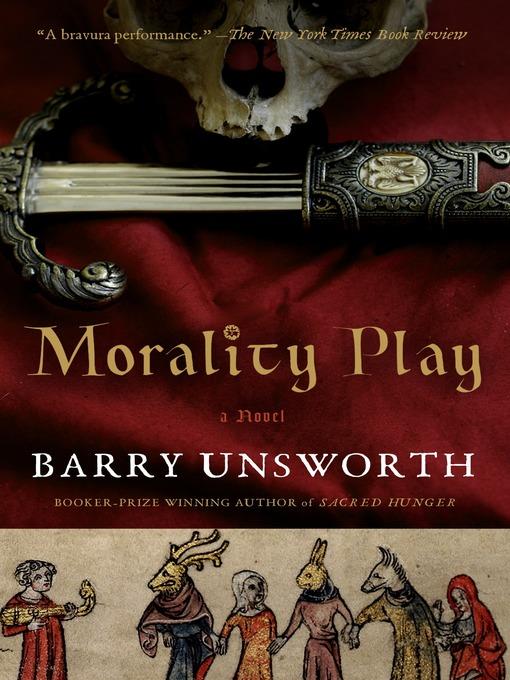
Morality Play
کتاب های مرتبط
- اطلاعات
- نقد و بررسی
- دیدگاه کاربران
نقد و بررسی

October 2, 1995
A portentous opening sentence--``It was a death that began it all and another death that led us on''--sets the tone for Booker Prize winner Unsworth's (Sacred Hunger) gripping story. Indeed, a larger spectre than those two deaths hangs over this tale set in 14th-century England. The Black Plague is abroad in the land, and here it also symbolizes the corruption of the Church and of the nobility. One bleak December day, young Nicholas Barber, a fugitive priest who has impulsively decamped from Lincoln Cathedral, comes upon a small band of traveling players who are burying one of their crew. He pleads to join them, despite the fact that playing on a public stage is expressly forbidden to clergy. His guilt and brooding fear of retribution pervade this taut, poetic narrative. Footsore, hungry, cold and destitute, the members of the troupe are vividly delineated: each has strengths and weaknesses that determine his behavior when their leader, Martin, suggests a daring plan. In the next town they reach, a young woman has been convicted of murdering a 12-year-old boy, on evidence supplied by a Benedictine monk. Desperate to assemble an audience, Martin suggests that they enact the story of the crime. This is a revolutionary idea in a time when custom dictates that players animate only stories from the Bible. As the troupe presents their drama, many questions about the murder become obvious, and they improvise frantically, gradually uncovering the true situation. This, in turn, leads to their imprisonment in the castle of the reigning lord and their involvement in a melodrama equal to the one they have acted. Among the strengths of this suspenseful narrative are Unsworth's marvelously atmospheric depiction of the poverty, misery and pervasive stench of village life and his demonstrations of the strict rules and traditions governing the acting craft; underlying everything is the mixture of piety and superstition that governs all strata of society. Though sometimes he strays into didactic explanations, Unsworth searchingly examines the chasm between appearance and reality and the tenuous influence of morality on human conduct. Author tour.

October 15, 1995
The author of the Booker Prize-winning Sacred Hunger (LJ 7/92) brings 14th-century England to life in this imaginative medieval mystery, which will inevitably invite comparisons with Umberto Eco's The Name of the Rose (LJ 4/1/83). Its narrator is Nicholas Barber, a young monk who has forsaken his calling and joined an itinerant troupe of players that gets caught up in the real-life drama of a small-town murder. The crime presents Barber and his fellows with an opportunity to attract a larger-than-usual audience, and they turn sleuths, weaving the bits of information yielded by their investigation into an improvised play that eventually reveals the surprising, sordid truth. Rich in historical detail, Unsworth's well-told tale explores some timeless moral dilemmas and reads like a modern page-turner. Recommended for fiction collections.-David Sowd, formerly with Stark Cty. District Lib., Canton, Ohio

November 1, 1995
Locating his "play" in fourteenth-century England, Unsworth dramatically portrays murder and deceit in this engaging new novel. Nicholas Barber, a 23-year-old monk, having broken his chastity vows, flees the wrath of his bishop and fellow monks. On the road, he accidentally witnesses the death of a traveling player and his subsequent mourning by fellow troupe members. Barber is discovered spying but is eventually initiated into the troupe, becoming a player himself. The troupe performs its standard morality play in a small town that winter before hearing of a young boy's murder and a deaf-mute girl's imprisonment for the crime. Attempting to portray the story as a drama for the town's entertainment, the players uncover the true story and find themselves in the middle of a corrupt power-play, and a morally twisted cover-up. Unsworth is quite skillful in revealing, by degrees, possible truths, plausible murderers, and the facts behind the players' drama. He subtly brings to the forefront the issue of an artist's rights and moral concerns in basing his or her art on reality. The novel is original in the way Unsworth depicts both actor's and playwright's sensibility as he unfolds this dark tale, but the popular appeal is in the ways it occasionally mirrors "Name of the Rose" and Ellis Peter's Brother Cadfael mysteries. ((Reviewed November 1, 1995))(Reprinted with permission of Booklist, copyright 1995, American Library Association.)

























دیدگاه کاربران